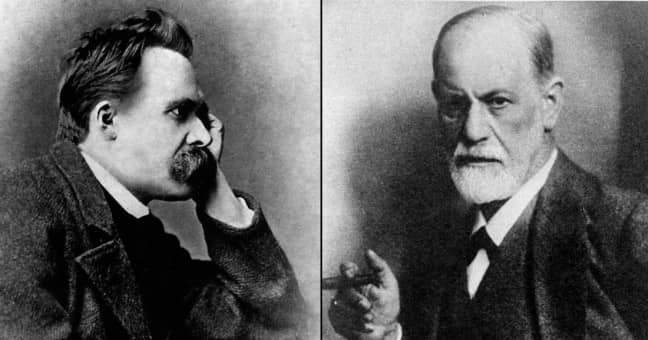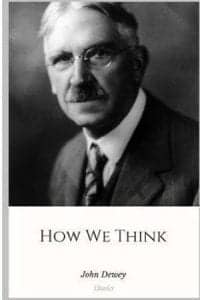Podcast: Download
Subscribe: Apple Podcasts | RSS
 Reflective thinking provides one of the fastest paths to living a better life.
Reflective thinking provides one of the fastest paths to living a better life.
No kidding: by being a reflective thinker you will literally reveal resources you already have within you and around you.
People who aren’t reflective thinkers? They remain blind to the resources right in front of their eyes.
Even better, the substantial improvements you can expect when you practice reflective thinking often include:
- Improved memory
- Optimized decision making
- Reduced stress
- Better relationships
- Superior reasoning skills
So if you’d like a reflective thinking model you can add to your life, stick around.
I’ve been practicing reflective thinking since I was a teenager and this post is for you.
What is Reflective Thinking?
I first came across this form of mental exercise when I read Albert Camus’ The Stranger in high school. It was the first time I realized it was possible to lead an interesting life, one much more exciting than the dreadful future I felt I was facing at the time.
Camus was an existentialist, which essentially boils down to using “radical honesty” and accepting the limits imposed upon our lives. To achieve radical honesty, you start by reflecting on the human condition for what it is, not what you want it to be.
As challenging as this form of reflection can be, shortly after I discovered this way of looking at the world, I realized that reflective thinking is a tradition. It goes back much further than the Ancient Greeks, for example. But Socrates remains a famous figure when it comes to this type of thinking. He said three highly memorable things that demonstrate reflective thinking in action:
- “The unexamined life is not worth living.”
- “I know that I know nothing.”
- “Look at how many things there are which I don’t want.”
In each of these examples, Socrates is turning the lens upon his experience of consciousness. He is looking at both the bigger picture of life and demonstrating something even more critical:
- He is showing that self-examination by being a reflective thinker gives life more value
- He recognizes the limits of his knowledge (like an existentialist)
- He divides his quality of mind from external, material objects in the world
By examining these statements and what they mean, we can develop a working definition of reflective thinking.
It is a form of self analysis that creates a more valuable experience of consciousness by revealing what is truly important in life. Its main requirement is radical honesty so that you avoid self deception.
Major Philosophers And Psychologists Who Used Critical Thinking And Reflection
The psychologist Albert Ellis remarked that he never would have discovered the processes that ultimately led to cognitive behavioral therapy (CBT) if “I had not been strongly influenced by philosophers rather than psychotherapists.”
(You can find this quote in the Albert Ellis Reader.)
Ellis’ reflection is an important observation (and example of self-reflection) because philosophers were doing the work of psychologists long before Sigmund Freud arrived on the scene.

In fact, in the Minutes of the Vienna Psychoanalytic Society (the session of 28 October 1908), Freud remarked that he found reading Nietzsche challenging to his sense of self-importance. He observed that Nietzsche had already covered the core ideas of psychoanalysis and could barely get through half a page without encountering insights Freud thought he’d discovered on his own.
There are many examples in Nietzsche to consider, but one of the strongest takes place at the end of Beyond Good and Evil. In the closing passage, he demonstrates reflective thinking by directing radically honest questions at this own career:
Did I seek where the wind bites keenest, learn to live where no one lives, in the desert where only the polar bear lives, unlearn to pray and curse, unlearn man and god, become a ghost flitting across the glaciers?
This passage is highly poetic, but read in context, Nietzsche is essentially asking: Did I try hard enough?

When applied to both our personal lives and our careers, this is one of the hardest questions we can ask ourselves. Yet, the benefits of taking on the rigors of this form of thinking are clear:
Only by asking such hard questions can we identify our weaknesses and find the path to personal growth.
Other philosophers and psychologists with a particular focus on thinking reflectively include:
- Voltaire
- Spinoza
- Leibniz (especially viewpoint dependency)
- Giordano Bruno
- Carl Jung
- Robert Langs
How to Think Reflectively In 5 Simple Steps
Albert Ellis gives one of the finest reflective thinking models around: A.B.C.
- A = Adversity
- B = Beliefs
- C = Consequences
Of course, not everything comes down to problems like adversity. You can think reflectively about positive things too, such as when you enjoy a painting or film.
But usually we find ourselves reflecting when we need to solve problems and gain mental strength. So let’s focus on how we can reduce adversity in our lives by analysing our beliefs and the consequences we create.
One: Identify Specific Thinking Goals For Your Reflective Thinking Sessions
As I just mentioned, reflective thinking doesn’t necessarily entail problem solving. When you want to improve your ability to reflect, start with the end.
For example, you might want to:
- Improve your objective reasoning skills
- Practice positive visualization using aspects of your personal history
- Learn to think more logically
- Develop the ability to think faster
When you know what you want out of thinking reflectively, you’ll get more out of the process.

Like Ellis, Dewey stresses the role of belief. But it can be abstract trying to figure out in both Ellis and Dewy how to find out where your beliefs are holding you back. That’s why a program like Self Authoring can be tremendously helpful. I describe an even more robust model you can try in The Victorious Mind: How to Master Memory, Meditation and Mental Well-Being.
Once you have a specific goal in mind, you can “stress-test” it using mind mapping. This activity can help make your thought process more visual and actionable.
Of course, a subset of setting goals for your thinking sessions is to also set aside the time for them. After all, a goal without a schedule is not really a goal at all.
Two: Practice Self Inquiry
We know that Socrates favored the examined life.
But how exactly do you exam life?
The answer is delightfully simple:
Ask yourself questions.
What kind of questions?
Well, it turns out that there is a process known as “self inquiry.” It is thousands of years old and part of philosophical traditions like Advaita Vedanta and Zen.
My two favorite questions are:
How do my thoughts behave?
Are they useful?
Why do these two questions work?
Such self inquiry questions essentially cause you to pay attention to your experience of consciousness itself.
In other words, you start to reflect on the experience of having a mind.
Other reflective thinking examples you can experience come from related questions in Gary Weber’s Evolving Beyond Thought:
- How real are my thoughts?
- Do my thoughts have value?
- Where does the sense of “real” and “unreal” come from?
- Where do my biases come from?
- What is my nature?
Some of these self inquiry questions are very challenging. I have found taking on the challenge incredibly valuable as I become a better thinker.
The best part?
These questions are portable. No matter what situation you’re in, you can ask them and find your way back to a neutral state, often within seconds.
As a person given to mental turbulence, I’ve come to call this neutral state, cruising altitude.
This process is not merely a spiritual or psychological pursuit. As Mekada Julia Graham shows in her book, Reflective Thinking in Social Work, “we are always composing and revising our autobiographies as we go along.”
Without inquiry, we miss the changes as they are taking place, and because many people do not use self-inquiry practices, they wind up wondering how on earth they wound up in their present position in life. Self-inquiry helps you see the broader picture both as it unfolds and as you are experiencing change in the present moment.
Three: Focus On The Right Problems
Albert Ellis pointed out that people often focus on their “primary disturbances.”
He suggested focusing on the “secondary disturbances” instead.
For example, many people with PTSD will focus on a scene of trauma. But since they cannot change the past, the real problem is the “secondary disturbance” caused by experiencing the memory.
To solve the problem, they need to focus on “the disturbance of being disturbed.”
This way of thinking about it can feel counterintuitive, but once you start practicing thinking in this way, you’ll find great mental relief a lot faster.
Four: Be A Realist
Psychologist William James pointed out in Radical Empiricism that we often experience humiliation in the pursuit of goals, but not from failure. Instead, we experience disappointment of how the journey for success played out.
This point brings us back to existentialism and radical honesty. A lot of people can use their minds to visualize success clearly. But because they are not realistic about either their goals or the journey they’ll have to take to get there, they suffer.
A realist, on the other hand, reflects deeply about what success really is and what it really takes to get it.
And because hard work is always involved in achieving anything worth having, a realist can let go of the outcome and enjoy the journey.

Working this way creates a win-win because when you reflect back on the time you spend in moving toward your goals, your memories of the pursuit will not be disappointing at all.
So how do you become a realist?
Practice observational learning. You can do this by learning to understand the difference between descriptive thoughts and judgmental thoughts.
For example, in the book, Promoting Reflective Thinking in Teachers : 50 Action Strategies, Germaine Taggart and Alfred Wilson explain that we can better express our views when we separate description from judgment.
One of their powerful suggested exercises involves finding a memory about a dramatic event. Write about the event two times. The first time, talk about how you felt and the second time, describe the event in neutral terms. Focus literally just on the facts.
They give this short example:
Judgmental: The child responded well to questioning.
Descriptive: The child responded correctly to five out of six questions.
As you can see, the descriptive version gives a much more accurate picture of what actually happened in the situation.
Five: Focus Your Reflections On Others
So far, we’ve talked a lot about focusing on yourself as an individual. There’s nothing wrong with that.
However, we’ve also noted William James’ warning that dissatisfaction comes more from the journey toward goals than failing to reach them.
Another key strategy for getting more out of the journey is to make sure that you are focused on others in your thinking.
By doing so, you can potentially experience Abraham Maslow’s concept of self-transcendence. As you may know, Maslow talked about the suffering we experience when we are not able to actualize ourselves. As Maslow says about the experience of someone capable of self-actualization:
“He is more able to fuse with the world, with what was formerly not-self, for example, the lovers come closer to forming a unit rather than two people, the I-Thou monism becomes more possible, the creator becomes one with his work being created, the mother feels one with her child.”

Essentially, Maslow is talking about the state of flow, or the feeling of oneness, rather than separation.
But to really feel fulfilled, we need to transcend the notion that there is a “self” at all. Self inquiry is essentially designed to help you experience that, and it can be tough.
But rest assured, As neuroscientists like Sam Harris have often pointed out, no research has yet discovered where the “self” exists in the brain.
So how do we get into a state of flow that helps us transcend?
A Powerful Reflection Exercise For Creating Flow
Seating on the floor or a chair, close your eyes.
Starting with the first letter of the alphabet, bring a person you know to mind. For A, you might think of Amy.
(If you can’t arrive at someone for any individual letter, just skip ahead. Do the best you can.)

Think about something you could do for that person. It doesn’t have to be monumental. The point of the exercise is to start reflecting on your ability to give.
By the time you’ve gone through the entire alphabet, you should be able to create a quick plan and then execute on it. Soon, you’ll start to feel amazing as you transcend your notion of the self.
Other Reflective Thinking Examples To Boost Your Progress
As you experience deeper reflective thoughts through the steps outlined above, here are some more activities you can explore.
Take everything one step at a time. Learning better thinking processes is a marathon, not a race.
Study Word Meanings
One problem we see in the world today is a lack of linguistic skills. People understand their own language with less dexterity than ever before. As a result, they fail to benefit from critical thinking that would otherwise benefit their lives.
But when you know what words mean and a little about their history, your thinking power goes way up.

We’ve talked a lot about suffering on this page. And it’s a perfect example of how to reflect differently by looking at words.
“Suffer” has the Latin word “ferre” in it, for example. This is the English word for “ferry.”
This suggests to us that our ancestors thought that pain had two aspects to it. The pain itself, and having to carry, or “ferry” that pain from one place to another.
(If you haven’t already, please think back to Ellis and the primary and secondary causes of suffering he identified.)
To give you another example, notice that the word “accept” has the Latin “capere” in it. This means “to take.”
Using our reflective thinking abilities, we can notice that suffering might be part of the world. But our ancestors did not include tolerance or resignation in the word “accept.”

In other words, although we might have to “accept” suffering, we don’t have to be resigned to “ferrying” it everywhere we go. We can seek relief even as we take on the pain. We can respond actively instead.
For more tips like this, check out these 9 Critical Thinking Strategies for lifelong learners.
Reflection-Based Meditation
The alphabet exercise I gave above is a form of reflection-based meditation.
But you can also reflect on:
- Your gratitude
- Compassion for others
- Hopes and dreams
- Fears and concerns
- Beauty in nature and art
- The role of change in the world
- How time passes
- Things you avoid but need to face
- Accomplishments in your personal and professional life
- Your faith or personal philosophy
- Cyclical patterns that show up in life
- Positive and negative habits you have
- Your personal identity and individualism
- Your education and knowledge
- Technology
- Social topics
- Your personal wealth
- Reason vs passion
- Your memory
Basically, if you can find the theme, you can make it the topic of your reflection-based meditations.

Memory Palace Activities For Learning
People don’t normally think of the Memory Palace technique as a tool for critical thinking and reflection, but it most certainly is.
For example, we know that Roman orators used this technique to deliver their speeches. And it seems clear that their audiences used the same technique to remember what was said.
This enabled people to think deeply about what was said.
This technique is also a means of understanding information that can be tough to process. Unfortunately, many memory experts say that you should understand information before memorizing it, but I have not found that to be the case at all.
Learn more about how to use this technique now.
Read Biographies Of Reflective Thinkers
Modeling other successful people not only shows you how success happens. It helps you identify steps to avoid.
And this returns us to where we started: Know the goals you have for your thinking activities.
If you want to cope with a problem, such as losing your sight, the reflections you’ll find in The Mind’s Eye by Oliver Sacks is going to be much more useful than a general guide to thinking.
Not only does Sacks share his own thought processes for coping with vision problems. He gives you references to the books he read so he could model success as he learned to cope himself.
To take another example, if you choose to transcend yourself and learn to reflect more deeply on others, you could zoom out from biographers and study great biographers. James Boswell is often considered the first, and Walter Isaacson is a great contemporary example of something digging deep into great thinkers like Leonardo Da Vinci, Albert Einstein and Steve Jobs.
There are many biographies and biographers to choose from, so think about who has the success you want and read about that person. Pay special attention to descriptions of how they thought and how they validated their thoughts through dedicated practice.
The Reflective Thinker Is An Artist, Scientist And Warrior Of The Mind
As you’ve discovered, there’s a lot that goes into practicing self reflection. The practice is thousands of years old and there are different ways to do it.
However, the commonalities amongst all the approaches are easy to spot:
- You need to be honest and focus on reality in your thinking
- You need to be philosophical and even artistic through techniques like mind mapping
- You need to analyze the process like a scientist
- You need to go beyond yourself and consider others
Ultimately, this practice involves thinking about thinking itself. And that reminds me of Tony Buzan’s concept of the “Warrior of the Mind.”
In books like Mind Map Mastery, Buzan urged us all to practice what he called “radiant thinking.”
Since we always want to analyze what words mean, focus on this notion of “radiation.”
Each thought we think exudes energy. And in no small way, thoughts are energy. They exist because of the positive and negative electrons flowing their own brains.
When you begin analyzing the experience of thinking from this perspective, you have become like a “warrior,” capable of standing up to any challenge. And all the more so when we continue reading critical thinking books that illuminate the nature of how our thoughts “radiate” and influence the world.
After all, when you reflect on it… where else are challenges experienced, except in your mind?
Once you realize this simple fact, you really can improve everything. Everything you experience is experience in you and you alone.
Hence the ancient Greek phrase: Know thyself.
Truly, you are the only one who can.
Related Posts
- 9 Critical Thinking Strategies That Lifelong Learners Need To Know
Reading on its own is not enough. You also need critical thinking strategies. Here are…
- Independent Thinking: 7 Tips On Becoming An Individual Thinker
Developing independent thinking doesn't have to be a hard task. These tips reveal how easily…
- Logical vs Rational Thinking: What’s the Difference?
Spotting the difference between logical and rational thinking can be tough. Learn the exact difference…










